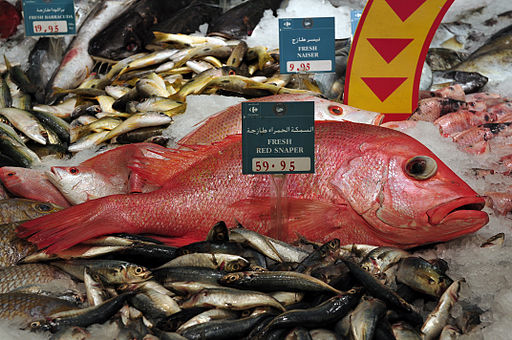A straightforward fisheries management change could help repopulate Kuwait’s waters in the Persian Gulf with Malabar blood snapper, a fish stock whose numbers dropped by 95 per cent between 1995 and 2009.

Ralf Roletschek, CC BY 3.0
Malabar blood snappers can live to about 46 years but do not reach sexual maturity until about five or six years, at which point they tend to be around an average length of 61. Currently Kuwait fisheries management prohibits catching fish under 40 centimeters and has no measures in place to prevent fishers from catching juvenile fish that are unable to reproduce.
“This reduces the reproductive capacity of the fish stock,” said Abdulrahman Ben Hasan, the study’s lead author and a PhD candidate at the IOF. “It will eventually collapse, which is what happened in Kuwait.”
The researchers offered two recommendations to Kuwait’s fisheries sector: impose a strict size limit of above 61 centimeters on all blood snapper catches, and modify fishing gear so that fish smaller than 60 centimeters don’t get caught in them.
“I think these measures are easily implemented,” Ben Hasan said. “Enforcement is a different matter — I think enforcement is difficult, and critical in situations where the discard mortality of undersized fish is high. But we still can go about that by changing the mesh size of the traps. We can also enforce higher minimum size limits by co-management, where fisheries management as well as the fisheries would work together. Fisheries management can communicate the substantial gains of catching snappers at older ages with the fishers.”
Malabar blood snapper biomass would increase by at least 300 per cent and catch by 130 per cent if the measures are enforced, according to the study.
“Fishers would lose a substantial fraction of the current gains on the short term by transitioning to a higher minimum size limit, but it is expected they would more than offset that in the coming years relative to continue fishing business-as-usual,” Ben Hasan said

Photo by SenuScape from Pexels
Ben Hasan said that he hopes that Kuwait’s fisheries management will consider the approach outlined in the study and combine it with strict enforcement.
“In cases where there are weak management institutions and high dependency on fisheries, where there is little data on fisheries, we can implement these easy changes to rebuild fish stocks and to also avert overexploitation of resources.”
“Alleviating Growth and Recruitment Overfishing through Simple Management Changes: Insights from an Overexploited Long-Lived Fish” was published in Marine and Coastal Fisheries: Dynamics, Management, and Ecosystem Science.